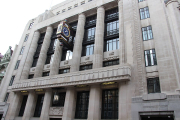
The New Year Honours recognise the achievements and service of extraordinary people across the UK.
Professor Adrian Michael (Mike) Cruise has played a significant role in making the UK an international leader in space science research. Currently Professor Emeritus at the University of Birmingham, where he established Gravitational Wave research, he made contributions to the first confirmed detection of gravitational waves in 2015.
Dr Paul Bate, CEO of the UK Space Agency, said:
I would like to congratulate Mike on behalf of everyone at the UK Space Agency for this well-deserved award.
Mike is a distinguished leader in the space science community who has directly contributed to our fundamental understanding of the nature and history of the Universe, through his work on gravitational waves – ripples in space time. In recent years he has also supported the delivery of major UK investments in international space missions such as Ariel and the Rosalind Franklin Mars rover, chaired the UK Space Agency’s Science Programme Advisory Committee, and led the Royal Astronomical Society as its President.
As an elected member of the European Space Agency’s Voyage 2050 Senior Committee, we will all continue to benefit from Mike’s expertise, as he helps to set the strategic direction for European space science for decades to come.
Gravitational waves are minuscule ripples in space-time thought to be triggered by massive events like the merging of black holes. Einstein predicted the existence of gravitational waves a century ago, and Professor Cruise’s work contributed to their first conclusive detection in 2015, from ground-based observatories.
To understand gravitational waves in more detail, scientists and engineers across the UK and Europe are now working on the development of a space-based gravitational wave observatory known as LISA (laser Interferometer Space Antenna). The European Space Agency mission will involve 3 separate spacecraft flying in a triangular formation, linked by a laser measurement system.
The UK’s leading role in this important mission, set to launch in the mid-2030s, has been supported by the work of Professor Cruise.
Professor Mike Cruise said:
It is an unexpected honour to receive this award. The fact that several UK space scientists have been rewarded in the New Year’s Honours list this year is a tribute to the strength of space science and astronomy in the UK, supported by the UK Space Agency and STFC. The space programme will inspire future generations of young scientists and engineers.
The UK is home to some of the most talented space scientists and astronomers in the world. Also recognised in the New Year Honours were Dame Maggie Aderin Pocock for services to Science Education and Diversity, Professor Emma Bunce for services to Astronomy and Science Education, and Professor Philip Diamond for services to Global Radio Astronomy. The UK Space Agency congratulates them all.









































